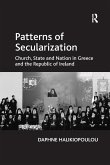27,99 €
inkl. MwSt.
Versandfertig in über 4 Wochen

14 °P sammeln
- Broschiertes Buch
- Merkliste
- Auf die Merkliste
- Bewerten Bewerten
- Teilen
- Produkt teilen
- Produkterinnerung
- Produkterinnerung
This book offers a concise, yet provocative, summation of Christos Yannaras' long reflection on the meaning of politics.
Andere Kunden interessierten sich auch für
![Hollow Gods Hollow Gods]() Davidson LoehrHollow Gods15,99 €
Davidson LoehrHollow Gods15,99 €![The Death of Politics The Death of Politics]() Peter WehnerThe Death of Politics17,99 €
Peter WehnerThe Death of Politics17,99 €![Dreams From Our Fathers Dreams From Our Fathers]() Dana JamesDreams From Our Fathers14,99 €
Dana JamesDreams From Our Fathers14,99 €![Believing in Russia - Religious Policy after Communism Believing in Russia - Religious Policy after Communism]() Geraldine FaganBelieving in Russia - Religious Policy after Communism73,99 €
Geraldine FaganBelieving in Russia - Religious Policy after Communism73,99 €![The Public Life of the ... Earl of Beaconsfield The Public Life of the ... Earl of Beaconsfield]() Francis HitchmanThe Public Life of the ... Earl of Beaconsfield27,99 €
Francis HitchmanThe Public Life of the ... Earl of Beaconsfield27,99 €![Message From the President of the United States, Transmitting Copies of the Correspondence Message From the President of the United States, Transmitting Copies of the Correspondence]() United States War DeptMessage From the President of the United States, Transmitting Copies of the Correspondence14,99 €
United States War DeptMessage From the President of the United States, Transmitting Copies of the Correspondence14,99 €![Patterns of Secularization Patterns of Secularization]() Daphne HalikiopoulouPatterns of Secularization62,99 €
Daphne HalikiopoulouPatterns of Secularization62,99 €-
-
-
This book offers a concise, yet provocative, summation of Christos Yannaras' long reflection on the meaning of politics.
Produktdetails
- Produktdetails
- Verlag: Taylor & Francis Ltd (Sales)
- Seitenzahl: 84
- Erscheinungstermin: 19. Dezember 2024
- Englisch
- Abmessung: 216mm x 140mm x 5mm
- Gewicht: 122g
- ISBN-13: 9781032532073
- ISBN-10: 1032532076
- Artikelnr.: 72106473
- Herstellerkennzeichnung
- Libri GmbH
- Europaallee 1
- 36244 Bad Hersfeld
- gpsr@libri.de
- Verlag: Taylor & Francis Ltd (Sales)
- Seitenzahl: 84
- Erscheinungstermin: 19. Dezember 2024
- Englisch
- Abmessung: 216mm x 140mm x 5mm
- Gewicht: 122g
- ISBN-13: 9781032532073
- ISBN-10: 1032532076
- Artikelnr.: 72106473
- Herstellerkennzeichnung
- Libri GmbH
- Europaallee 1
- 36244 Bad Hersfeld
- gpsr@libri.de
Christos Yannaras is Professor Emeritus at Panteion University of Social and Political Sciences in Athens, Greece. Jonathan Cole is Assistant Director of the Centre for Religion, Ethics and Society at Charles Sturt University in Canberra, Australia.
Foreword
Introduction
Translator's note
Acknowledgements
1. Reverence and justice
2. Necessity and freedom
3. Forms of organized co-existence
4. Cohesion through coercion
5. Leitourgima's degeneration into office
6. Ratio dethrones authority
7. The desire for "salvation" dethrones ratio
8. The Ecclesia and religion: incompatible modes of existence
9. When truth becomes the priority
10. Politics: contest or art?
11. Shared need as shared truth
12. The pre-political character of freedom
13. The alignment of the ecclesia of the demos and the ecclesia of the
believers
14. The exercise of authority as responsible service
15. The common roots of democracy, community, and the parish
16. The political consequences of the Ecclesia's religionization
17. Religious totalitarianism
18. Ideology: the alienation of truth into accuracy
19. Societas: the alienation of communion into a partnership
20. Religious "salvation" and political individualism
21. Materialistic and idealistic utilitarianism
22. Politics is not the aim of the Ecclesia; The Ecclesia itself is the aim
of politics
23. Augustine is Europe
24. Political forms of religious individualism
25. The Ecclesia's alienation in confessionalism
26. A Trinitarian archetype of politics
27. Comprehension is not knowledge
Introduction
Translator's note
Acknowledgements
1. Reverence and justice
2. Necessity and freedom
3. Forms of organized co-existence
4. Cohesion through coercion
5. Leitourgima's degeneration into office
6. Ratio dethrones authority
7. The desire for "salvation" dethrones ratio
8. The Ecclesia and religion: incompatible modes of existence
9. When truth becomes the priority
10. Politics: contest or art?
11. Shared need as shared truth
12. The pre-political character of freedom
13. The alignment of the ecclesia of the demos and the ecclesia of the
believers
14. The exercise of authority as responsible service
15. The common roots of democracy, community, and the parish
16. The political consequences of the Ecclesia's religionization
17. Religious totalitarianism
18. Ideology: the alienation of truth into accuracy
19. Societas: the alienation of communion into a partnership
20. Religious "salvation" and political individualism
21. Materialistic and idealistic utilitarianism
22. Politics is not the aim of the Ecclesia; The Ecclesia itself is the aim
of politics
23. Augustine is Europe
24. Political forms of religious individualism
25. The Ecclesia's alienation in confessionalism
26. A Trinitarian archetype of politics
27. Comprehension is not knowledge
Foreword
Introduction
Translator's note
Acknowledgements
1. Reverence and justice
2. Necessity and freedom
3. Forms of organized co-existence
4. Cohesion through coercion
5. Leitourgima's degeneration into office
6. Ratio dethrones authority
7. The desire for "salvation" dethrones ratio
8. The Ecclesia and religion: incompatible modes of existence
9. When truth becomes the priority
10. Politics: contest or art?
11. Shared need as shared truth
12. The pre-political character of freedom
13. The alignment of the ecclesia of the demos and the ecclesia of the
believers
14. The exercise of authority as responsible service
15. The common roots of democracy, community, and the parish
16. The political consequences of the Ecclesia's religionization
17. Religious totalitarianism
18. Ideology: the alienation of truth into accuracy
19. Societas: the alienation of communion into a partnership
20. Religious "salvation" and political individualism
21. Materialistic and idealistic utilitarianism
22. Politics is not the aim of the Ecclesia; The Ecclesia itself is the aim
of politics
23. Augustine is Europe
24. Political forms of religious individualism
25. The Ecclesia's alienation in confessionalism
26. A Trinitarian archetype of politics
27. Comprehension is not knowledge
Introduction
Translator's note
Acknowledgements
1. Reverence and justice
2. Necessity and freedom
3. Forms of organized co-existence
4. Cohesion through coercion
5. Leitourgima's degeneration into office
6. Ratio dethrones authority
7. The desire for "salvation" dethrones ratio
8. The Ecclesia and religion: incompatible modes of existence
9. When truth becomes the priority
10. Politics: contest or art?
11. Shared need as shared truth
12. The pre-political character of freedom
13. The alignment of the ecclesia of the demos and the ecclesia of the
believers
14. The exercise of authority as responsible service
15. The common roots of democracy, community, and the parish
16. The political consequences of the Ecclesia's religionization
17. Religious totalitarianism
18. Ideology: the alienation of truth into accuracy
19. Societas: the alienation of communion into a partnership
20. Religious "salvation" and political individualism
21. Materialistic and idealistic utilitarianism
22. Politics is not the aim of the Ecclesia; The Ecclesia itself is the aim
of politics
23. Augustine is Europe
24. Political forms of religious individualism
25. The Ecclesia's alienation in confessionalism
26. A Trinitarian archetype of politics
27. Comprehension is not knowledge








